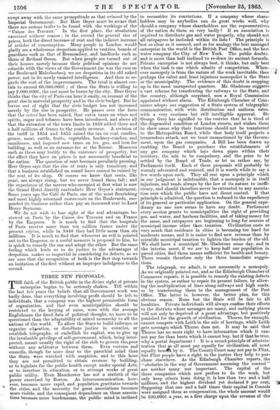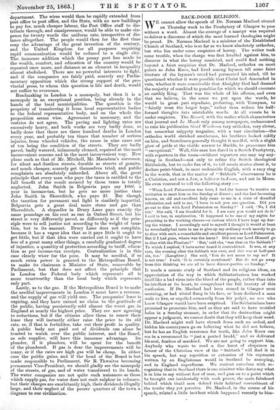THREE NEW PROPOSALS.
THE faith of the British public in the divine right of private enterprise begins to be seriously shaken. Till within the last few years the beliefs that all Government work was badly done, that everything involving profit should be left to individuals, that a company was the highest permissible form of organization, and that even municipalities should be restricted to the levying of rates, were with the average Englishman the fixed data of political thought, no more to be questioned than the adaptability of mixed monarchy to all the nations of the world. To allow the State to build railways, or organize education, or distribute justice in counties, or establish telegraphs, or embellish its capital, was to give up the invaluable privilege of self-government, which, being inter- preted, meant usually the right of the rich to govern the.poor without any arbitrator between them. Even vestries and councils, though far more dear to the parochial mind than the State, were watched with suspicion, and to this hour they are not permitted to obtain revenue by building, or to legislate for the public health except under special Acts, or to interfere in education, or to attempt works of great public utility. Even Manchester has not a sixtieth of the power exercised by Boston. As intercommunication, how-
. ever, becomes more rapid, and population gravitates towards the cities, and the necessity for great associations becomes more visible, and the consequent dependence on those associa- tions becomes more burdensome, the public mind is inclined to reconsider its convictions. If a company whose share- holders may be anybodies can do great works well, why should a company whose shareholders are the representatives of the nation do them so very badly ? If an association is required to distribute gas and water properly, why should not all ratepayers be included within its lists I The principle is
of so clear as it seemed, and as for analogy the best managed enterprise in the world is the British Post Office, and the best water company the City of New York. The public doubts, and is more than half inclined to re-draw its ancient formula. Private enterprise is not always best, it thinks, but only best when the task is one which admits of competition. When- ever monopoly is from the nature of the work inevitable, then 4 perhaps the safest and least injurious monopolist is the State or the municipality. The evidence of this doubt is cropping up in the most unexpected quarters. Mr. Gladstone suggests a vast scheme for transferring the railways to the State, and the country, although surprised, sees a Royal Commission appointed without alarm. The Edinburgh Chamber of Com- merce adopts our suggestion of a State system of telegraphic communication, with wide distribution and uniform rates, with a very cautious but still intelligible approval. Sir George Grey has signified to the vestries that he is tired of the disgraceful condition of London streets, and wishes them to show cause why their functions should not be transferred to the Metropolitan Board, while that body itself projects a tremendous attack, not we trust unsanctioned by the Govern- ment, upon the gas companies. A Bill has been drawn up enabling the Board to purchase the establishments of any gas company which lays down pipes within their territory, the sale to be compulsory, and the price to be settled by the Board of Trade, or let us rather say, by Parliament itself. Each of these proposals will probably be warmly advocated and resisted, and it is worth while to say a few words upon each. They all rest upon a principle which in our judgment is indefeasible, that a monopoly is in itself injurious, and tends always by the law of its nature to ineffi- ciency, and should therefore never be entrusted to any associa- tion over which the public have not direct control. If that principle is admitted, the question is reduced to the expediency of its general or particular application. On the general expe- diency no one now seems to have any doubt. Parliament every session grants to municipalities the right of providing gas, and water, and harbour facilities, and of taking money for the same, and ratepayers are beginning to long for sources of municipal income other than taxation. Civilization costs so very much that residence in cities is becoming too hard for moderate means, and it is easier to find new revenue than by scientific municipal taxation to lighten the burden of the old. We shall have a municipal Mr. Gladstone some day, and in the interim must, if we are to keep half our population in paved cities, find them means sufficient for health and beauty. There remain therefore only the three immediate sugges- tions.
The telegraph, we admit, is not necessarily a monopoly. As we originally pointed out, and as the Edinburgh Chamber of Commerce repeats, it is possible to remedy the existing defects in the system, or rather to repair its present failure, by allow- ing the multiplication of lines along railways and high roads, or by transferring them to the management of the Post Office. The latter is, however, the better plan, for this obvious reason. None but the State will be fair to all localities. Private individuals will always confine their efforts to the districts where messages are many, and outlying places will not only be deprived of a great advantage, but positively punished for the growth of civilization. Thurso, for example, cannot compete with Leith in the sale of herrings, while Leith gets messages which Thurso does not. It may be said that Thurso has no more right to have information which it can- not pay for than boots which it cannot buy, but if that be true, why a postal department ? It is a sound principle of adminis- tration that is all must pay equally for civilization, all must equally ben by it. The County Court may not pay in Flint, but Flint people have a right to the justice they help to pur- chase elsewhere. As the Edinburgh Chamber reports, the " obstacles in the way of Government assuming the control " are neither many nor important. The capital of the three companies which now profess to do the work, but only keep others from doing it, is less than two and a half millions, and the highest dividend yet declared 9 per cent, Supposing that one and a half times their capital in Consols were assigned them as compensation, the whole amount would be 100,0001. a year, as a first charge upon the revenue of the department. The wires would then be rapidly extended from post office to post office, and the State, with no new buildings to pay for, much cheaper labour, the Post Office staff to dis- tribute through, and omnipresence, would be able to make six- pence for twenty words the uniform rate, irrespective of dis- tance altogether. The people would then for the first time reap the advantage of the great invention of the century, and the United Kingdom for all purposes requiring rapid communication would be reduced to a single city. The immense addition which the penny post has, made to the wealth, comfort, and education of the country would be repeated once more, and distance as an element in inequality almost abolished. There are no powerful interests to fight, and if the companies are fairly paid, scarcely any Parlia- mentary opposition which the strong support of the pro- vincial press, to whom this question is life and death, would not suffice to overcome.
Roadmaking in London is a monopoly, but then it is a monopoly in an exceptional position, being already in the hands of the local municipalities. The question is the propriety of transferring it from local representative bodies to the federal representative body, and on the whole the proposition seems wise. Agreement is necessary, and the vestries do not agree. The paving and lighting rates are excessively heavy, and both works are very badly done, so badly done that there are three hundred deaths in London every year, and probably ten times that number of serious injuries, from wheeled vehicles, the cause in nine cases out of ten being the condition of the streets. They are badly paved, badly watered, infamously cleaned, repaired at the most inconvenient seasons and in the most inconvenient way. New plans such as that of Mr. Mitchell, Mr. Macadam's successor, for silent and dustless streets, durable as streets of granite, and much cheaper, scarcely get themselves tried, and public complaints are absolutely unheeded. Above all, the great principle that every man who pays the taxes is entitled to the full benefit of the result secured by those taxes is totally neglected. John Smith in Belgravia pays say 100/. a year in income-tax, but he gets no more justice than John Smith in Shoreditch, who pays 2/. But though the taxation for pavement and light is similarly impartial, Belgravia gets a great deal more stone and gas than Shoreditch. A slopseller in Drury Lane pays exactly the same poundage on his rent as one in Oxford Street, but his street is very differently paved, as differently as if the prin- ciple were to sell justice not according to the weight of taxa- tion, but to its amount. Drury Lane does not complain, because it has a vague idea that as it pays little it ought to get little, but if that idea were carried out it ought to have less of a great many other things, a carefully graduated degree of injustice, a quantity of protection according to tariff, educa- tion as per income-tax receipts. Centralization is in this case clearly wiser for the poor. It may be needful, if so much extra power is granted to the Metropolitan Board, to make its chairman a Minister of State, removable by Parliament, but that does not affect the principle that in London the Federal body which represents all is more trustworthy than the local body which represents only part.
Lastly, as to the gas. If the Metropolitan Board is to make the needful improvements in London it must have a revenue, and the supply of gas will yield one. The companies' lease is expiring, and they have earned no claim to the gratitude of the public, having persistently sold almost the worst gas in England at nearly the highest price. They are now agreeing to reductions, but if the citizens allow them to renew their lease they will instantly either raise the price to its old rate, or, if that is forbidden, take out their profit in quality. A public body not paid out of dividends can alone be trusted to watch over the public interest, and the Board, as sole supplier, will have this immense advantage. Its plunder, if it plunders, will be spent for the benefit of the plundered. If gas is dear the improvements will be many, or if the rates are high gas will be cheap. In either case the public gains, and if the head of the Board is but made responsible to Parliament, Sir R. Thwaites becoming permanent Vice-President, we should gladly see the monopoly
of the streets, of gas, and of water transferred to its hands. The water companies are not quite such nuisances as those
which supply gas, for water does not emit sulphur in volumes, but their charges are exorbitantly high, their dividends illegally large, and their neglect of the poorer quarters of the town a disgrace to our civilization.































 Previous page
Previous page